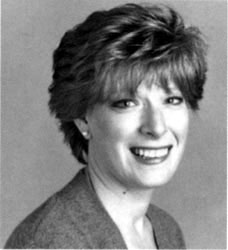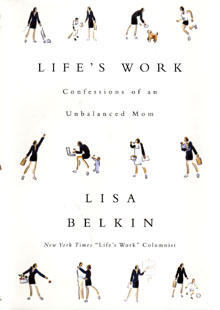|
Web
Exclusives:Features July
7, 2002:
By Kathryn Levy Feldman '78 A contributing writer to the New York Times Magazine since 1995, Lisa Belkin Gelb '82 pens the Time's "Life's Work" column, which focuses on the intersection (and collision) of life and work. Her third book, Life's Work: Confessions of an Unbalanced Mom, published in May, is her take on trying to "do it all," complete with the realization that it's okay to do just some of it. Belkin Gelb, who uses her maiden name professionally, spoke with PAW about her new book and her unbalanced life.
PAW: I think at this particular point in your career it would it be fair to say that your life imitates your art. Was that always the case? BELKIN: Well I was always busy. Even back at Princeton, I was busy. When I got out of school and got a job and I was busy. Then I had kids and I knew what the word "busy" meant. But that doesn't mean that without them you're not swamped. Activity expands to fill the available space and children take up a lot of it. I don't know a single person who has a day where everything fits. I don't think they exist. BELKIN: It is the story of how I adapted to my two children, Evan, who was born in 1991 and Alex who was born in 1994. PAW: Is it a collection of your columns from the New York Times? BELKIN: I'll put it this way: the columns are the pineapple and then I wrote a lot of Jell-O. You never know what story you are living until you look back on it. The story that I was living, without even realizing it, was a continuing saga of readjustment. I was always searching for something that made me feel like all the pieces were in balance. Work has always been important to me. My family has always been important to me. I am constantly trying to mesh the two. PAW: What kind of adjustments have you made? BELKIN: First I commuted. I was one of the first annoying people on Metro North with a cell phone. I would talk all the way home because that got me an extra hour. I didn't have to sit at a desk next to an editor. And then I created a home office. And when the powers that be [at the New York Times] said, "No. We won't allow you to do that; it's bad precedent," I quit. Then I went on contract and ended up doing more work for them than when I was on staff. It's all been a search to make me feel like it's working. PAW: How long have you been writing the "Life's Work" column? BELKIN: For three years. Evan was eight and Alex was five when I started. Which is amusing because, at the time, I considered myself the worst example of balancing life and work. In the introduction of the book, there is a scene in the pediatrician's office. I had taken my son for his yearly visit, which happened, that particular year, to require shots. The problem was that a magazine article that I was working on was closing exactly at the same time. So there I was, in the doctor's waiting room, scribbling changes to a magazine galley and phoning them in to the copy desk, with my nervous little boy's head in my lap. I was hardly a model for balance. Yet, it wasn't long after that episode that the editors of the Times asked me to write the column. I figured it would give me answers. PAW: What was the premise behind the column? BELKIN: The column has always been about the intersection of jobs and personal lives. My original plan was that I was going to be an advice columnist, of sorts. I was going to call lots of smart people and have them tell me what I didn't know. Here's what so and so does and I tried it and it works, kind of approach. Instead, it's become a conversation because there are no answers or smart people who can say here's how you do it. And the book evolved around the realization that the reason there is no expert who can give me an answer is because it can't be done. PAW: Why do you call it a conversation? BELKIN: I've received 10,000 emails (give or take), in two and a half years. Lots of articulate, creative, well educated, loving, energetic people write to me but I still haven't gotten that email that says "Here's how you do it. It's easy. Why is everyone complaining?" No body feels like they are doing it right. They're all sure somebody else is. PAW: Are those 10,000 emails mostly from women or men? BELKIN: I am surprised by how many men I hear from. I expected there to be next to none. But that said, there are still far more women than men. This is something that women struggle with more than men. It doesn't mean that men don't struggle with it. Women struggle with it more. PAW: Let's talk about some of the specifics. Where in the house do you work? Do you have specific hours? Does your office have a door? BELKIN: I work in a separate office that I set up in a room over the garage and it's actually a pretty nice place. I have a door, on which I had a lock installed about two years ago. I also have an OPEN/CLOSED sign on my desk, like the kind they have at a gas station. So when I hear my children coming in from school and I'm in the middle of a phone call that can't be interrupted, I flip it to CLOSED. They know that if they come in and see the CLOSED sign, they should sit down and be quiet. These tools work about 50 percent of the time. PAW: Any electronic tools? BELKIN: Sure. There's the laptop, the cell phone, the fax machine, the scanner and the copier. None of this would have been possible without the technology. PAW: Did you always know you wanted to be a writer? BELKIN: No, it was gravitational pull. I always thought writing was something you liked to do but you didn't do it when you grew up. Law or medicine was something you did. I got saved from law school at the very last minute by an internship at The Times. PAW: Did any particular courses at Princeton help prepare you for your career? BELKIN: I was a politics major but I lived at the Daily Princetonian. The DP was my graduate school and John McPhee is God. PAW: Did you take his course? BELKIN: Yes. John turned me from someone who thought writing was fun into someone who thought of herself as a writer. That was the single, most important course I've taken. PAW: Where do you get your column ideas? BELKIN: Air. My life. Other peoples' lives. Now, most of them come from email. I am having this remarkable conversation with the New York metropolitan area. I asked that my email address be put in my column (I was the first one at the Times to have one) and people write and tell me about their lives. It's Belkin@NYTimes , by the way. PAW: Which brings us to how do you separate Belkin from Gelb? BELKIN: Some days badly. I don't like having two halves even though I am two different people. Sometimes, it makes me a little schizoid even though, in some ways, it makes it easier for me to escape from one half of my life into the other. My latest challenge has been my signature. I sign my name Lisa Belkin Gelb. It's the name on my passport; it's the name on my credit cards; it's something I don't think about any more, except lately. I've been going around signing books written by Lisa Belkin. Every single time I sign a book (and I've been signing hundreds), I've had to concentrate on my signature. How often do you have to concentrate on your signature? I'm sure that at some point I'm just going to keep writing and add the extra name, but I haven't done it yet.
PAW: Did your first two books parallel your life the way the "Life's Work" currently column does? BELKIN: Well, now that I think about it, each of them spoke to something that was going on in my life at the time. First Do No Harm was written while I was living in Houston. The Medical Center there is huge. It has its own skyline. You can't live there without being intrigued by the Medical Center and I was married to a doctor so I found that world more intriguing than I otherwise would. It was also the point in my life when I was trying to sort out this world that I had married into. I sat in on an ethics committee for three years, (the group of people in the hospital who get the thorniest decisions passed their way) and the book is a look at a hospital as seen through the prism of an ethics committee. PAW: How did you get that access? BELKIN: I'm not quite sure. The particular hospital that I wrote about had a phenomenal ethics committee and a very forward thinking chairman. But before I could get to her I had to get through the entire administrative mechanism of the hospital, which three years earlier had been through a real scandal. They were eager to prove that they were open and available to all comers and I guess I was the first person who showed up. I asked if I could do this. They agreed. The only requirement was that everything was confidential until I got the patient's permission. Everything the doctors said was on the record and available to me but if they were talking about a patient I had to approach the patient's family for permission to pursue it further. If they said absolutely not, it was as if I had not heard it. I had a parking pass. I had an ID badge. I came and went as I pleased. Six months after I got there they fired the entire public relations office in a big budget cut so no one knew I was there. I spent two and a half more years just becoming part of the scenery. It really was remarkable access. I've never had it before or since. PAW: And the second book? BELKIN: The second book I thought was going to be a magazine piece. I had just moved to Westchester (New York) and I kind of knew about the city of Yonkers housing fight, in which a federal judge ordered the city of Yonkers to pick up 200 of its poor, minority families and move them to city funded housing on the white middle class side of town. Basically, the judge said, "Redo your map" and that was enough to correct what he found to be 40 years of blatant housing discrimination. I had just moved here and this was taking place kind of close to my house so it's a book as much about the meaning of home as it is the story of everyone in the book who is searching for a home and defining what home means. It's a book about home written by a first time homeowner and it's also a piece of history about this particular fight. Belkin's "Life's Work" column appears in the New York Times Job Market section every other Sunday.
|

 The
clash of careers and kids
The
clash of careers and kids PAW:
How would you define your current book?
PAW:
How would you define your current book?